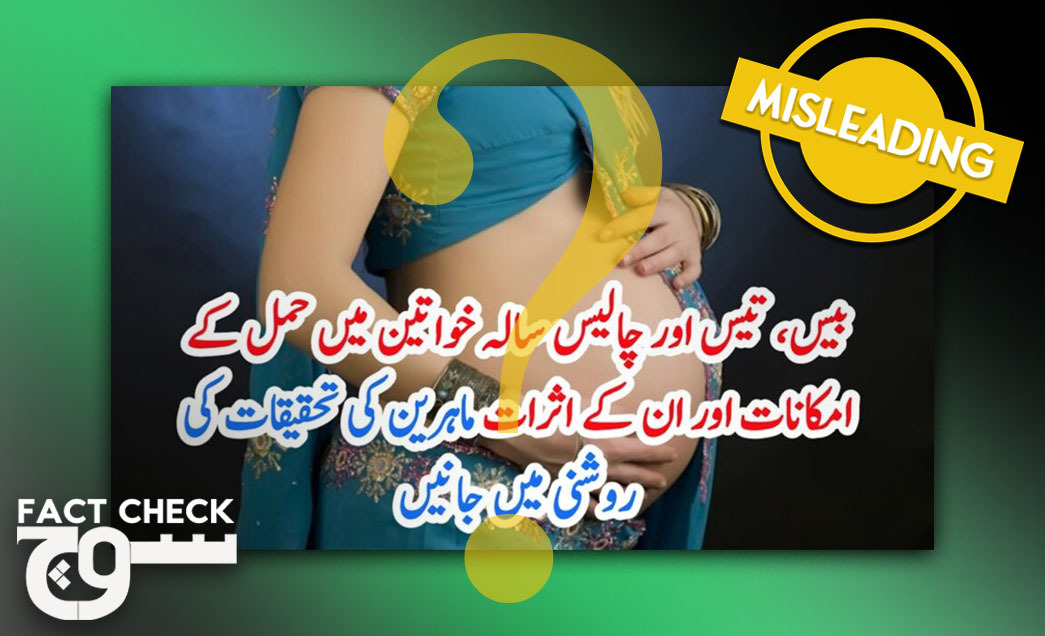
Claim: An Urdu news website published an article with the headline, “Chances and impact of pregnancy among 20, 30, and 40 years old women. Know more in the light of expert’s research.” The article states that after 30 years of age, women experience low chances of conceiving and a high risk of complications during pregnancy.
Fact: The article is misleading as it makes various claims about the chances of conceiving and prenatal complications affecting different age groups of women which are not sufficiently backed up by medical data.
On 8 January 2022, Urdu news website The News Reporter published an article on the chances of conception and impacts of pregnancy across different age groups of women. The link to the article was shared here in a Facebook post, which was then reshared 25 times by private Facebook accounts. The article was also published here and here on 10 and 11 January respectively. The article claims that women have low-risk pregnancies at younger ages particularly in their 20s, which is partially true. It also claims that women who conceive after 30 are more likely to suffer complications like high blood pressure and diabetes, and that there is also a higher risk that children born to mothers over the age of 30 will have Down Syndrome. These claims are misleading, as will be further explained below. The article also states that women in their 40s face difficulties conceiving and sustaining their pregnancies due to low levels of fertility.
To investigate the veracity of the claims presented in the article, Soch Fact Check spoke to Dr. Darakhshan Saeed, who is a medical officer in the gynecology department at a public sector hospital in Lahore. Dr. Saeed explained that while the chances of conceiving are low at an early age, between 16 to 20 years, and after the age of 40, a lot rests on the body structure and fertility of each woman. She further explained that antepartum (during pregnancy) and postpartum (after delivery) depression is not thought to hinge on maternal age. Factors including hormonal imbalance, use of steroid medications, and environmental factors can cause depression even in young mothers.
Dr. Saeed referred to the article as misleading because pregnancy complications like high blood pressure, diabetes, and the risk of a child being born with Down Syndrome are connected more to the mother’s underlying health and do not necessarily become more likely after age 30. She elaborated that the risk of a child being born with Down Syndrome is higher in mature pregnancies, but this is usually after 38 or 40 years of age, not after 30. According to the National Down Syndrome Society of America, the higher risk of a child being born with Down Syndrome applies to mothers over 40 years of age. The maternal age chart with the reported ratio can be seen below:

Finally, Dr. Saeed emphasised that age alone cannot be used to make generalizations about pregnancy complications; women under 25 years of age also face complications. While advanced maternal age may lead to certain unique complications, so too can conceiving at younger ages. For instance, one study found that people younger than 24 and older than 35 had higher rates of preterm birth than those who were ages 30 to 34.
The article in question thus misleads the audience without any reference to research. Some claims regarding a woman’s fertility at different ages are partially true, but the claims regarding the impact of a woman’s age on pregnancy complications are misleading because they characterize maternal age as the most significant factor in determining the risk of pregnancy complications, neglect to mention that younger women also face pregnancy complications, and assert that certain risks are higher after age 30 when in reality those risks do not become significant until much later, likely after age 38 or 40. According to Dr. Saeed, women under 20 and over 39 are generally at higher risk of experiencing complications during pregnancy, depending on their medical histories.
Conclusion: The chances of women conceiving and pregnancy complications do not hinge only on advanced maternal age. Several other factors also impact upon the risk of pregnancy complications, including early-age motherhood. The article referred to womens’ ages as the prime source of complications which is misleading in general. Further, the article made misleading claims about the chances and risks of conceiving in one’s 30’s.
